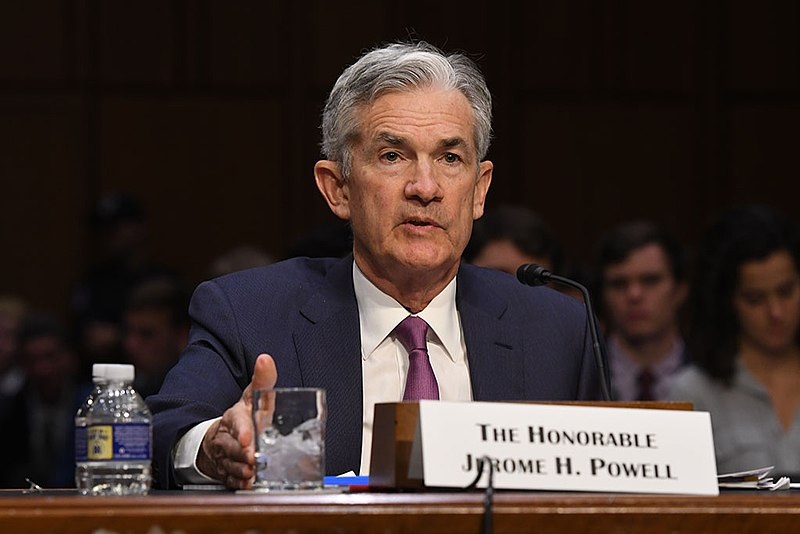economy online news
By Daniel Avis
US inflation is “still too high” despite a recent slowdown, Federal Reserve Chair Jerome Powell said Thursday, leaving the door open for a new interest rate hike. online news
Additional evidence of “persistently above-trend growth,” or a reversal of the recent decline in job openings and softening of wage growth could cause the Fed to reconsider its current rate pause, he told a conference in New York.
If the US economy develops in this way, it “could put further progress on inflation at risk and could warrant further tightening of monetary policy,” he said in a speech that was briefly delayed by climate change protesters.
The Fed recently slowed its aggressive campaign of monetary tightening which lifted its benchmark lending rate to a 22-year high, as it looks to slow down inflation without pushing the US economy into recession.
Headline inflation, as measured by the Fed’s favored gauge, has more than halved since peaking in June last year, but remains stuck above its long-term target of two percent.
“Inflation is still too high, and a few months of good data are only the beginning of what it will take to build confidence that inflation is moving down sustainably toward our goal,” Powell said.

“We cannot yet know how long these lower readings will persist, or where inflation will settle over coming quarters,” he continued, adding that the Fed would proceed “carefully” at future interest rate meetings.
All three major US stock indexes fell after Powell’s speech was published, before rebounding to trend positive for the day at around 1:20 pm local time (1720 GMT).
Monetary policy is ‘restrictive’
Powell said the Fed’s current policy stance is “restrictive,” suggesting that monetary policy was working to put “downward pressure on economic activity and inflation.”
But he warned that “a range of uncertainties, both old and new,” were complicating monetary policy.
“Doing too little could allow above-target inflation to become entrenched,” he said.
“Doing too much could also do unnecessary harm to the economy,” he added.
Recent data points to the continued strength of the US economy supported by resilient consumer spending, while the tight labor market is showing some signs of softening.
The Fed’s upcoming decisions will be “based on the totality of the incoming data, the evolving outlook, and the balance of risks,” he said, echoing previous comments.
Futures traders currently assign a probability of more than 95 percent that the Fed will announce it will hold interest rates steady on November 1, following its next meeting, according to data from CME Group.
Geopolitical tensions threaten economy
In a highly unusual move, Powell also addressed the ongoing conflict between Israel and Hamas militants in Gaza.
“Geopolitical tensions are highly elevated and pose important risks to global economic activity,” he said.
“Speaking for myself, I found the attack on Israel horrifying, as is the prospect for more loss of innocent lives,” he continued.
The Fed’s role is to monitor what economic implications these developments could have, he added.
Analysts have voiced concerns that the Israel-Hamas war could spread into a broader regional conflict in the crude-rich Middle East, with implications for oil production.
da/md
© Agence France-Presse All rights are reserved
economy online news
Notes from APS Radio News
Reportedly because of what was being called a “pandemic”, a number of the world’s central banks embarked on massive programs of monetary expansion, starting in late February and early March of 2020.
For its part, between the early part of March of 2020 to over a year later, the US Federal Reserve added over $4 trillion to its holdings, by purchasing billions of dollars’ worth of Treasury bonds and corporate bonds each month during that period.
As well, at that time it kept interest rates rather low.
Other central banks, including the Bank of Japan and the European Central Bank, followed similar policies.
In addition, during that period many countries engaged in lockdowns; many small and medium-sized businesses and enterprises were shuttered by way of orders issued by public health officials, politicians and various administrators.
One of the direct causes of those shutdowns was the development of shortages.
According to a number of economists, the combination of shortages of various goods and services and massive programs of “quantitative easing” led to substantially higher rates of inflation.
In consequence of shuttered economies and higher rates of inflation in the first world, less developed countries suffered greatly, due, in part, to shortages of supplies and due to lowered demand.
For some time, in its articles about China, The Wall Street Journal has pointed to “covid” related lockdowns as being one of the major causes of China’s downturn in its economy.
In the US, by October of 2020, over 100,000 businesses had been shuttered by way of lockdowns.
In general, critics have said that it wasn’t the pandemic or epidemic, which term one uses describe a virus that had a mortality rate comparable to the seasonal flu, was not the proximate cause of inflation and economic dislocations.
Rather, they say, dumb or even malicious policies that were imposed by way of the virus narrative caused those problems and major levels of weath redistribution, for example, in the form of record numbers of mergers and acquisitions and an increase in the number of the world’s billionaires.
Newspapers like the Wall Street Journal have been maintaining that, in addition to interest rate increases undertaken by the Federal Reserve, increases in long-term Treasury bonds, will have the effect of reducing higher rates of inflation.
The Federal Reserve sets short-term interest rates.


